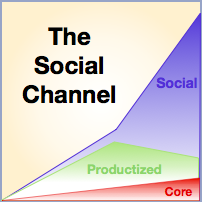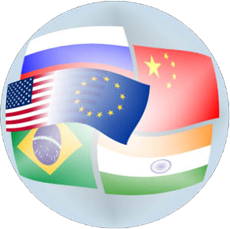
Africa [credit: Mapswire.com]
Africa is a nascent innovation powerhouse, and its leadership will become increasingly obvious during the coming decades, but the seeds are already visible as this post reveals: Africa’s population is exploding, and its young people are adopting tech alternatives to countries’ long-insufficient health, education, and financial infrastructure.
If you’ve been interested in international development for long, you have seen many prognostications about “Africa rising” over the years only to see them fade into oblivion. Predicting profound economic shifts is like predicting earthquakes; you study the driving forces and your algorithms crunch the data.
That isn’t stopping Helga Stegmann. She has led “user experience” agency Mantaray since 2006, and she gave a riveting talk last week in Chicago hosted by partner agency BoldInsight. In my experience, user experience folks rarely have their hands on the pulse of disruptive economic change, but the reason she is an exception reflects that Africa’s economic transformation is happening at the grassroots level (as with most revolutions), and her key orientation is user experience design, so researching users across rapidly evolving interfaces in devices. Follow along with my notes of her remarks […]
 Ethnographic research for cross border business shows how to apply ethnographic research of social media to reducing the risks and costs of doing cross border business and deals. Ethnographic research can transform the value proposition of international business because it’s a very efficient way to conduct due diligence, to study the behavior and motivations of the people that the deal proposes to serve. Unlike traditional research methods, which are relatively slow, costly and qualitative, ethnographic research of social media combines qualitative richness with quantitative analysis. It’s faster and less costly, too. Ethnographic research for cross border business shows how to apply ethnographic research of social media to reducing the risks and costs of doing cross border business and deals. Ethnographic research can transform the value proposition of international business because it’s a very efficient way to conduct due diligence, to study the behavior and motivations of the people that the deal proposes to serve. Unlike traditional research methods, which are relatively slow, costly and qualitative, ethnographic research of social media combines qualitative richness with quantitative analysis. It’s faster and less costly, too.
Ethnographic research for cross border business can dramatically improve the depth and breadth of research for business and corporate strategy, market entry strategy, customer development, human capital strategy, product management, and others since it allows teams to consider more users and to assess their behavior and motivations, which can improve the value of more costly research.
Imagine that you can get deep qualitative and quantitative data on what your proposed clients, customers, employees and partners are discussing among themselves, specifically about the business scenario you propose to address. Ethnographic allows you to validate, with real people, […]
 The Social Channel of Value explains our era’s drivers of economic transformation and how leaders can use them to strengthen their careers, organizations and communities. Profound shifts in human beings’ means of production restructure society and business because they alter the amount of “value” human work can create as well as the type of “products” that encapsulate people’s work. Individuals and organizations that notice, observe and understand these shifts early on can improve their relevance and competitiveness. Many of those that do not respond quickly enough go down with the ship. The Social Channel of Value explains our era’s drivers of economic transformation and how leaders can use them to strengthen their careers, organizations and communities. Profound shifts in human beings’ means of production restructure society and business because they alter the amount of “value” human work can create as well as the type of “products” that encapsulate people’s work. Individuals and organizations that notice, observe and understand these shifts early on can improve their relevance and competitiveness. Many of those that do not respond quickly enough go down with the ship.
Since the Social Channel is so important, I have published the Social Channel Trilogy, which is summarized here. Find even more information on the Social Channel home page.
[…]
Social Channel Three: Using the Social Channel to Defend Native Markets and Penetrate Foreign Markets
 The global Social Channel will reintroduce “home court advantage” to national brands because those that use social business to compete globally by collaborating with users will have the cultural advantage; “foreign” firms may have better product features for the money, but they will not match home brands’ cultural fluency. Personalized service and attention are culturally specific, and deep cultural fluency directly correlates to intimacy. However, brands can only develop the home court advantage by practicing social business at an advanced level. Most have a long way to go and, meanwhile, they will get hammered when they persist in competing on product features in the Productized Channel of Value. The global Social Channel will reintroduce “home court advantage” to national brands because those that use social business to compete globally by collaborating with users will have the cultural advantage; “foreign” firms may have better product features for the money, but they will not match home brands’ cultural fluency. Personalized service and attention are culturally specific, and deep cultural fluency directly correlates to intimacy. However, brands can only develop the home court advantage by practicing social business at an advanced level. Most have a long way to go and, meanwhile, they will get hammered when they persist in competing on product features in the Productized Channel of Value.
The blade cuts both ways: the home court advantage will make exporting to emerging markets much more difficult in the years ahead. The Social Channel will raise the bar because users in all markets will increasingly expect brands to relate to them and to solicit their input and advice. Brands will have to invest significantly in developing in-market social […]
 The Maple Leaf Digital Lounge has selected the Social Network Roadmap(SM) to build the social presence behind its launch, and CSRA has been working with their team for a few weeks. The Maple Leaf Digital Lounge (“MLDLCA”) is a virtual ecosystem that promotes discovery and collaboration among Canadian digital startups, foreign and Canadian investors and other enablers. Their mission is to facilitate cross-border high tech deals. “The Lounge” has two incarnations: several online venues combined with periodic physical events. Their launch event will happen on March 12 at the South by Southwest Interactive (“SxSW”) conference. Read on for my insights from working with them so far. The Maple Leaf Digital Lounge has selected the Social Network Roadmap(SM) to build the social presence behind its launch, and CSRA has been working with their team for a few weeks. The Maple Leaf Digital Lounge (“MLDLCA”) is a virtual ecosystem that promotes discovery and collaboration among Canadian digital startups, foreign and Canadian investors and other enablers. Their mission is to facilitate cross-border high tech deals. “The Lounge” has two incarnations: several online venues combined with periodic physical events. Their launch event will happen on March 12 at the South by Southwest Interactive (“SxSW”) conference. Read on for my insights from working with them so far.
Also see the case study in video and presentation formats, which illustrates the social business model, Digivents. Note, the case study uses the MLDLCA’s new name, North of 41.
[…]
President Bill Clinton challenged IIT alumni to use their ingenuity in the service to mankind: “Being a good citizen no longer means paying your taxes and depending on your government. We can use innovation to help the less fortunate directly.” His message fell on ready ears and was deeply appreciated by 2,500 graduates of the Indian Institutes of Technology at PanIIT, their annual global conference, which was held in Chicago, Illinois. […]
New Exit Strategy for Mature Manufacturers—Acquisition by Asian Firms shows how process excellence can inject new vitality into ailing manufacturers.
 Picture this: you are the CEO of a venerable manufacturer that has been besieged by price pressure, increased imports and high capital costs. Revenue has been barely edging up, and profits have been negative three of the last five years. You have had to lay off a significant portion of manufacturing personnel, many of whom had been with you more than a generation.Your ship is still taking on water despite best efforts, and you do not know where to turn. Picture this: you are the CEO of a venerable manufacturer that has been besieged by price pressure, increased imports and high capital costs. Revenue has been barely edging up, and profits have been negative three of the last five years. You have had to lay off a significant portion of manufacturing personnel, many of whom had been with you more than a generation.Your ship is still taking on water despite best efforts, and you do not know where to turn.
This was precisely the situation of several U.S. firms that took the unusual route of selling themselves to Indian firms that turned the companies around very quickly by applying sophisticated process and management expertise. In many cases, local employment increased because the companies became much more competitive. Here are two examples:
[…]
India Trade Minister Draws Chicago-India Parallels at Executives’ Club offers coverage of Shri Kamal Nath’s Chicago presentation. Key themes: new global economic architecture presages economic realignment and thinking beyond the obvious to tap emerging opportunities.
 Illinois leaders were addressed by His Excellency Shri Kamal Nath, Minister of Commerce and Industry, Republic of India. True to form, His Excellency struck chords of transformation, partnership, common interests and harmony at the lunch held in his honor at the University Club on 19 February 2008. Attending were Chicago Mayor Richard M. Daley, Mr. Rajinder Bedi, Managing Director of the Illinois Office of Trade and Investment, The Honorable Susan Schwab, U.S. Trade Representative, Craig S. Donohue, Chief Executive Officer, CME Group and John Estey, President & Chief Executive Officer, SC Electric Company. Illinois leaders were addressed by His Excellency Shri Kamal Nath, Minister of Commerce and Industry, Republic of India. True to form, His Excellency struck chords of transformation, partnership, common interests and harmony at the lunch held in his honor at the University Club on 19 February 2008. Attending were Chicago Mayor Richard M. Daley, Mr. Rajinder Bedi, Managing Director of the Illinois Office of Trade and Investment, The Honorable Susan Schwab, U.S. Trade Representative, Craig S. Donohue, Chief Executive Officer, CME Group and John Estey, President & Chief Executive Officer, SC Electric Company.
Reading between the lines, the U.S. and India stand at a significant turning point: India’s impressive economic growth is a significant element of the ongoing redistribution of global economic power—which holds excellent opportunities for U.S. businesses and workers that are looking for it.
[…]
Globalization’s 21st Century Makeover explains how “emerging” market companies are rapidly becoming global players—to whit, new owners for Jaguar and Land Rover.
 Emerging countries have long been regarded by globalizers as targets for exploitation, but 21st century market forces are turning legacy thinking on its head, which produces disruption and its sibling, opportunity. Emerging countries have long been regarded by globalizers as targets for exploitation, but 21st century market forces are turning legacy thinking on its head, which produces disruption and its sibling, opportunity.
The conventional thinking goes that emerging countries like Brazil, Russia, India and China (BRIC) have talented knowledge/human capital resources that can be tapped in outsourcing and offshoring arrangements. Moreover, these workers’ employment in high value knowledge jobs creates a new consumer class among large populations. Emerging countries’ rapidly growing consumer markets stand in sharp contrast to developed countries’, which are flat or shrinking. China and India have been relaxing restrictions on foreign ownership, which has increased FDI, especially in China, enabling foreign companies to invest in and buy BRIC companies.
However, the big story in 2007 was the opposite:
[…]
Will China’s Rise Lead to an Environmental Catastrophe? summarizes The Economist Chicago debate, examining the environmental fallout of the Chinese economic supernova—sibling rivalry rears its ugly head.
 In 2007, nary an RSS feed or the page of a newspaper (for those still inclined ,^) does not mention China’s exploding impact on the global stage: China is truly an economic supernova, and it is breaking almost any record for development that is laid before it. However, China’s breakneck development is accompanied by grave environmental fallout: for example, as the host of the Beijing 2008 Olympic Games, the city is designing extreme measures to ensure that the air is clean enough for the athletes to breathe. The chief culprit is coal, a key source for China’s insatiable need for electric power, and a resource that the country has in abundance. For key facts on China, I suggest The Economist’s Country Briefing or CSRA’s Emerging Markets category (in depth) or China tag (mentions). In 2007, nary an RSS feed or the page of a newspaper (for those still inclined ,^) does not mention China’s exploding impact on the global stage: China is truly an economic supernova, and it is breaking almost any record for development that is laid before it. However, China’s breakneck development is accompanied by grave environmental fallout: for example, as the host of the Beijing 2008 Olympic Games, the city is designing extreme measures to ensure that the air is clean enough for the athletes to breathe. The chief culprit is coal, a key source for China’s insatiable need for electric power, and a resource that the country has in abundance. For key facts on China, I suggest The Economist’s Country Briefing or CSRA’s Emerging Markets category (in depth) or China tag (mentions).
The Economist and WBEZ 91.5 FM presented an Oxford-style debate on the effect that China’s rise […]
|
|


 Ethnographic research for cross border business shows how to apply ethnographic research of social media to reducing the risks and costs of doing cross border business and deals. Ethnographic research can transform the value proposition of international business because it’s a very efficient way to conduct due diligence, to study the behavior and motivations of the people that the deal proposes to serve. Unlike traditional research methods, which are relatively slow, costly and qualitative, ethnographic research of social media combines qualitative richness with quantitative analysis. It’s faster and less costly, too.
Ethnographic research for cross border business shows how to apply ethnographic research of social media to reducing the risks and costs of doing cross border business and deals. Ethnographic research can transform the value proposition of international business because it’s a very efficient way to conduct due diligence, to study the behavior and motivations of the people that the deal proposes to serve. Unlike traditional research methods, which are relatively slow, costly and qualitative, ethnographic research of social media combines qualitative richness with quantitative analysis. It’s faster and less costly, too. The Social Channel of Value explains our era’s drivers of economic transformation and how leaders can use them to strengthen their careers, organizations and communities. Profound shifts in human beings’ means of production restructure society and business because they alter the amount of “value” human work can create as well as the type of “products” that encapsulate people’s work. Individuals and organizations that notice, observe and understand these shifts early on can improve their relevance and competitiveness. Many of those that do not respond quickly enough go down with the ship.
The Social Channel of Value explains our era’s drivers of economic transformation and how leaders can use them to strengthen their careers, organizations and communities. Profound shifts in human beings’ means of production restructure society and business because they alter the amount of “value” human work can create as well as the type of “products” that encapsulate people’s work. Individuals and organizations that notice, observe and understand these shifts early on can improve their relevance and competitiveness. Many of those that do not respond quickly enough go down with the ship. The Maple Leaf Digital Lounge has selected the Social Network Roadmap(SM) to build the social presence behind its launch, and CSRA has been working with their team for a few weeks. The Maple Leaf Digital Lounge (“MLDLCA”) is a virtual ecosystem that promotes discovery and collaboration among Canadian digital startups, foreign and Canadian investors and other enablers. Their mission is to facilitate cross-border high tech deals. “The Lounge” has two incarnations: several online venues combined with periodic physical events. Their launch event will happen on March 12 at the South by Southwest Interactive (“SxSW”) conference. Read on for my insights from working with them so far.
The Maple Leaf Digital Lounge has selected the Social Network Roadmap(SM) to build the social presence behind its launch, and CSRA has been working with their team for a few weeks. The Maple Leaf Digital Lounge (“MLDLCA”) is a virtual ecosystem that promotes discovery and collaboration among Canadian digital startups, foreign and Canadian investors and other enablers. Their mission is to facilitate cross-border high tech deals. “The Lounge” has two incarnations: several online venues combined with periodic physical events. Their launch event will happen on March 12 at the South by Southwest Interactive (“SxSW”) conference. Read on for my insights from working with them so far. Picture this: you are the CEO of a venerable manufacturer that has been besieged by price pressure, increased imports and high capital costs. Revenue has been barely edging up, and profits have been negative three of the last five years. You have had to lay off a significant portion of manufacturing personnel, many of whom had been with you more than a generation.Your ship is still taking on water despite best efforts, and you do not know where to turn.
Picture this: you are the CEO of a venerable manufacturer that has been besieged by price pressure, increased imports and high capital costs. Revenue has been barely edging up, and profits have been negative three of the last five years. You have had to lay off a significant portion of manufacturing personnel, many of whom had been with you more than a generation.Your ship is still taking on water despite best efforts, and you do not know where to turn. Illinois leaders were addressed by His Excellency Shri Kamal Nath, Minister of Commerce and Industry, Republic of India. True to form, His Excellency struck chords of transformation, partnership, common interests and harmony at the lunch held in his honor at the University Club on 19 February 2008. Attending were Chicago Mayor Richard M. Daley, Mr. Rajinder Bedi, Managing Director of the Illinois Office of Trade and Investment, The Honorable Susan Schwab, U.S. Trade Representative, Craig S. Donohue, Chief Executive Officer, CME Group and John Estey, President & Chief Executive Officer, SC Electric Company.
Illinois leaders were addressed by His Excellency Shri Kamal Nath, Minister of Commerce and Industry, Republic of India. True to form, His Excellency struck chords of transformation, partnership, common interests and harmony at the lunch held in his honor at the University Club on 19 February 2008. Attending were Chicago Mayor Richard M. Daley, Mr. Rajinder Bedi, Managing Director of the Illinois Office of Trade and Investment, The Honorable Susan Schwab, U.S. Trade Representative, Craig S. Donohue, Chief Executive Officer, CME Group and John Estey, President & Chief Executive Officer, SC Electric Company. Emerging countries have long been regarded by globalizers as targets for exploitation, but 21st century market forces are turning legacy thinking on its head, which produces disruption and its sibling, opportunity.
Emerging countries have long been regarded by globalizers as targets for exploitation, but 21st century market forces are turning legacy thinking on its head, which produces disruption and its sibling, opportunity. In 2007, nary an RSS feed or the page of a newspaper (for those still inclined ,^) does not mention China’s exploding impact on the global stage: China is truly an economic supernova, and it is breaking almost any record for development that is laid before it. However, China’s breakneck development is accompanied by grave environmental fallout: for example, as the host of the Beijing 2008 Olympic Games, the city is designing extreme measures to ensure that the air is clean enough for the athletes to breathe. The chief culprit is coal, a key source for China’s insatiable need for electric power, and a resource that the country has in abundance. For key facts on China, I suggest The Economist’s Country Briefing or CSRA’s Emerging Markets category (in depth) or China tag (mentions).
In 2007, nary an RSS feed or the page of a newspaper (for those still inclined ,^) does not mention China’s exploding impact on the global stage: China is truly an economic supernova, and it is breaking almost any record for development that is laid before it. However, China’s breakneck development is accompanied by grave environmental fallout: for example, as the host of the Beijing 2008 Olympic Games, the city is designing extreme measures to ensure that the air is clean enough for the athletes to breathe. The chief culprit is coal, a key source for China’s insatiable need for electric power, and a resource that the country has in abundance. For key facts on China, I suggest The Economist’s Country Briefing or CSRA’s Emerging Markets category (in depth) or China tag (mentions).